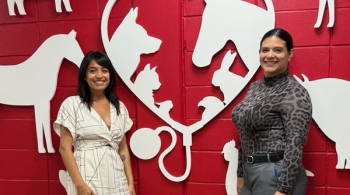
Taking the lead
See how a little mentorship can make a big difference.
My entire childhood was horses. My room was covered in horse posters. Horse books and figurines adorned my bookshelves. I lived for my weekly riding lesson. In my teenage years I was fortunate to attend a summer camp in Vermont that was, yep, horse camp. There I spent every day taking care of horses, riding horses, showing horses, and living with other campers who also ate, slept, and breathed horses.
Ahead of the class
Being slightly older when I attended the camp, I was placed in the counselor-in-training program. As part of the program, I was responsible for teaching the girls the ropes, so to speak, and supervising a section of the barn while the girls led their horses to pasture at the end of each day.
One young girl in my group was rather nervous with her assigned horse. When she walked her mare, she kept an arm's length between them instead of walking alongside the horse's head with one hand near the halter. When the horse naturally bowed her head to graze, the girl would cry. She was clueless as how to get the mare's head back up. She'd pull and pull and the horse wouldn't budge. In amazement—and with a little annoyance—I'd wonder how anyone attending this camp could be so unskilled.
At the end of my rope
One day while I was tending to my barn duties, she approached me. She asked me to lead her horse to pasture. The mare wouldn't follow her. Couldn't she see I was in charge of the barn? "I'm kinda busy here," I said.
The second time she came to me, she had tears in her eyes. Frustrated—and letting it show—I dropped my pitchfork and took her to the horse's stall. "Here, this is how you put the lead rope on," I said gruffly as I snapped it on. "This is where you hold the rope. This is how you properly lead the horse. You do it. Yes, you have to do it now."
She gingerly took the lead rope as I had showed her and started leading the horse. Ten steps later, the mare put her head down. The girl shrieked and started crying.
"I can't do it," she choked.
"The mare isn't in charge, you are," I said and took the lead out of her hands. I gently tugged the rope, clucked, and walked on. The mare obediently followed. I handed her back the rope and we started walking. Again, the mare bowed. This time the girl did what I had showed her and the mare responded. We did this all the way to the pasture.
A rewarding revelation
A few weeks later, the girl came to speak to me in the barn. She thanked me from the bottom of her heart for helping her that day. I couldn't believe it. Deep down I knew I didn't deserve her appreciation. I had been short, uncaring, and only concerned with my barn responsibilities. Yet she was grateful. And thanks to what I had done, she had grown to love that horse and was taking her home for the winter.
I'll never forget that day. It was life changing for me. It's the day I realized that the girls were just as important as my barn duties—if not more so. It was also the day I discovered that a simple act of kindness—no matter how small—could change a life.
Goodwill is easy to give, and it's one of the best gifts you can bestow on people, including your colleagues. So take the time to lend fellow team members a hand, especially when they ask for help. You may have learned the ropes by trial and error without the benefit of a mentor, but that doesn't mean the next generation of team members has to learn that way. Remember, we're all in veterinary medicine as a team, and the stronger your team, the better your practice—and you as an individual—will be.
Kristine Suszczynski is the hospital manager at Portland Veterinary Specialists in Portland, Maine. Please send your questions and comments to
Newsletter
From exam room tips to practice management insights, get trusted veterinary news delivered straight to your inbox—subscribe to dvm360.






